I love games. Always have, always will. Digital, tabletop, physical—doesn’t matter. My first career was playing one, but I think the biggest thing that’s drawn me to them is what games reveal about the person playing them. What lengths are you willing to go to win? How do you feel when you lose? Do you abide strictly by the rules, or are you willing to bend or break them entirely? At its core, a game is a wholly unnatural construct, something we collectively agree isn’t real, yet games can have absurdly profound effects on reality, creating myths and monsters out of mortals.
I also love books, and some of my favorite books involve games. Not due to any particular nuance of a specific game itself, but how these books use the ideas of games to explore broader concepts of empathy, social structure, and human nature. The game itself is secondary to the people involved, a platform from which to grapple with much larger ideas, because for me that’s what the best SFF has always been about—a new lens we can use to examine who we are, where we’ve been, and what we might become.
Buy the Book
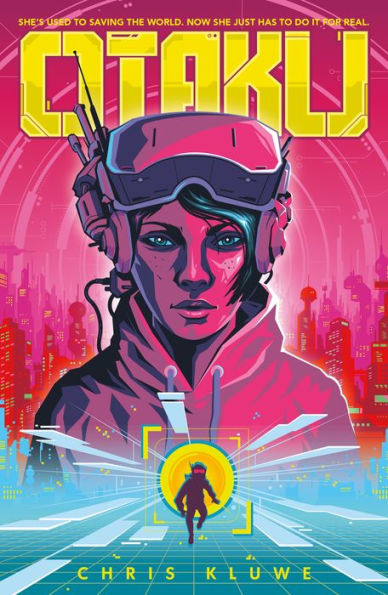

Otaku
When I wrote my book, I wanted to pay homage to the games I’ve played, but I also wanted to try and follow in the footsteps of those who made their works about so much more than just a competition of wits or athleticism. I wanted to examine the culture that surrounds games, a culture many consider divorced from reality, but a culture that permeates our reality nonetheless. I wanted to make people think about something more than just the game, and I have no idea whether or not I’ve succeeded (I hope I have!), but I know for certain that the following books and the games they contain are well worth your time.
The Player of Games by Iain M. Banks
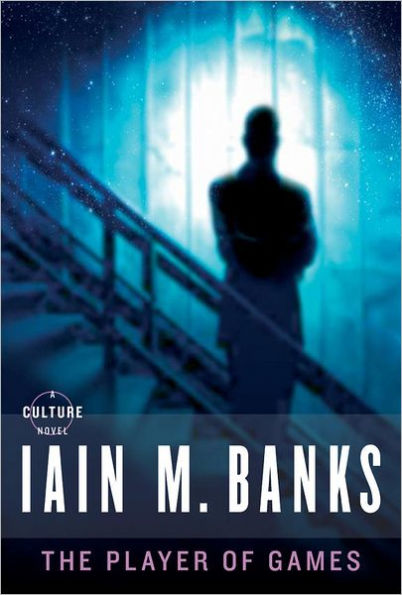
On the surface, this is a very straightforward book about a man named Gurgeh who plays games, and who is very good at playing games, but once you start reading you realize that The Player of Games is about so much more than that. Set in Iain Banks’ Culture universe, the rules of the game Gurgeh is recruited to play are never explained, but they don’t have to be, as the book is really about how our choices in a game designed to simulate reality reveal who we really are and what we value, and what it means when someone who was expecting to win ends up losing. Like Banks’ other Culture novels, the environments are fantastic and at times unsettling, but the story told is quintessentially human.
Thud! by Terry Pratchett
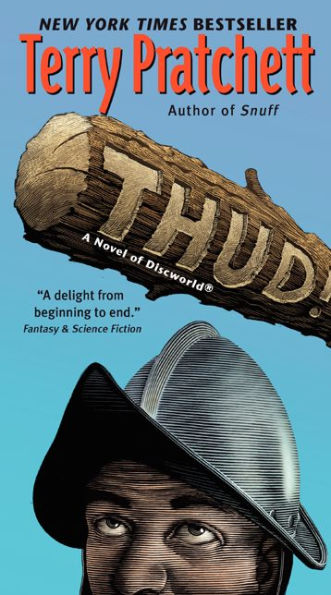
I’m a huge fan of the Discworld series, and Thud! is another excellent entry to that universe. The eponymous game of the novel makes multiple appearances, each filled with Pratchett’s typical blend of humor and cutting insight, but the focus is never on the outcome of the game itself, but learning to think from a new perspective, best exemplified when Sam Vimes learns that playing a complete game requires playing as both sides. This book gives hope that perhaps differences can be solved with the clash of carved stone figures in a pleasantly lit room instead of bloody conflict on a forever battlefield. If you’re looking for wit and grace while tackling weighty issues of racism and the cycle of revenge, you can’t go wrong with Thud!
Wyrm by Mark Fabi
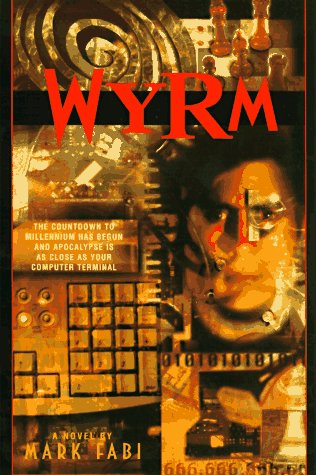
This is an older book, first published in 1997 when fears of Y2K were prevalent, and deals with a sentient computer virus that may or may not be looking to destroy the world. Unfortunately for the protagonist, the only way to track it down is by eventually playing through a specially designed massively multiplayer online game (MMO) that contains numerous references to Monty Python and other bits of geek culture. What I really like about this one is that the author is also a psychiatrist, and it contains some interesting ideas on the nature of human thought and the meaning of intelligence. Some of the culture references might be a bit dated now, but the concepts Fabi wrestles with regarding what drives our decision making processes are still very much pertinent and well worth exploring.
Halting State by Charles Stross
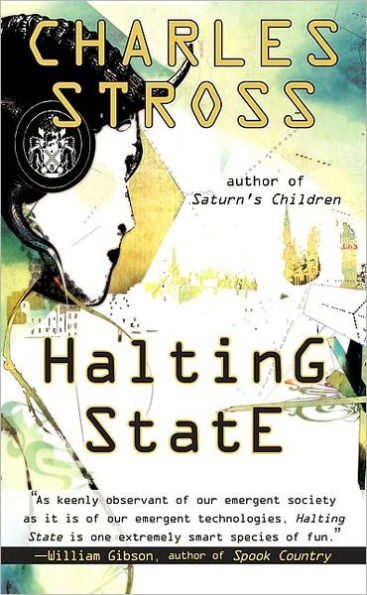
Stross is a magnificent author at exploring complex technical issues in wild yet realistic ways, and Halting State uses both an MMO game and an augmented reality game to ponder issues with cryptography, digital nation-state conflict, and financial markets (all of which are even more relevant today). While the second person perspective can feel odd at first, after several chapters I felt like it was totally natural, and any book that has a gang of orcs backed by a dragon robbing a bank has my enthusiastic recommendation. I will say, out of all the books I’ve talked about, Halting State’s augmented reality game is probably the most likely to be something we’ll actually see in real life, which is slightly terrifying to think about, but forewarned is forearmed, so go read up on it.
Empires of EVE by Andrew Groen
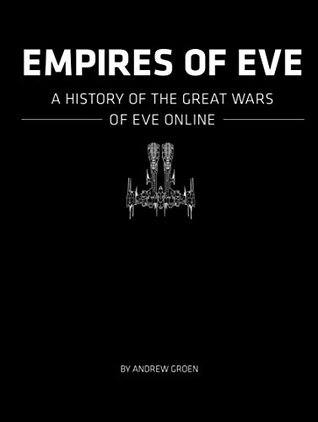
For the final book, I’ve decided to throw you a bit of a curveball. Empires of EVE is about a real life MMO, EVE Online, and chronicles a multitude of battles, betrayals, and bombastic personalities that would fit right at home in any fictional work, but they’re all real people and events that occurred in the gameworld of EVE. Groen does an incredible job of explaining various intricacies of the gameworld so that the reader has enough knowledge to understand who is fighting and why a particular conflict is important, but never bogs down in unnecessary minutiae. He also goes into depth on one of the things that makes EVE unique among MMOs—the amount of real life maneuvering and shenanigans that occur in service to in-game goals, including spying, propaganda, and infiltration of opposing factions that can span months or even years of work. EVE Online is one of the few MMOs I haven’t played, but it’s one I’ll read about whenever it pops up in the news, and Empires of Eve is a collection of tales that would do any bard proud.
Originally published in March 2020
Chris Kluwe is the author of the acclaimed non-fiction collection Beautifully Unique Sparkleponies, a contributor to Press Start To Play, and the lead designer of the tabletop card game Twilight of the Gods. A former NFL player, Kluwe has received wide attention for his TED talk about the future of technology, virtual reality, and empathy, and has been profiled in The New York Times, The Wall Street Journal, USA Today.











Some wonderful books on there! What about Melissa Scott’s wonderful Burning Bright? One of Arkansas’s best writers, too.
I was a RuneScape player very early on, around early/mid-2001. Literally twenty years ago, somehow – definitely as early as co-creator Andrew Gower would sometimes show up on the forums to mingle with the players. There were still only about four areas on the map to explore; I don’t think that big dangerous free-for-all ‘Wilderness’ area to the north had even been added yet.
What’s now called ‘RuneScape Classic’ ended up being my only MMORPG experience so far, and I don’t think I’d played for more than a few months, but I got really into it at the time. (I’d often take my dinner and eat it in front of that giant CRT monitor while RuneScaping – I can still taste the freezer perogies and the chocolate protein-shakes I pretty much lived off at the time because I hadn’t learned to cook yet and my diet was generally terrible.) Some of the players had already organized themselves into loose clans, which wasn’t something the game required or even necessarily encouraged at the time, and the power dynamics were getting complicated and interesting. Someone made a GeoCities page called The History of RuneScape Clans. It’s no more than a few pages – but those are eventful pages, and from not very much time.
All this is to say that I’ve never played EVE but darn, I’m absolutely fascinated to hear about Empires of EVE and now I want to read it. That’s one heck of a way to ensure that collective storytelling just emerges organically, but is based in a certain speculative world with its own rules.
A book where gaming (and cosplay) (and Cons) figure in the plot (a murder at a con) is “Bimbos of the Death Sun” which is very funny, but very much of its time (the 80’s), and parts haven’t aged well.
The Otherland series by Tad Williams, where you can be jacked into a virtual world, ala The Matrix, by implants in your sensory system. There’s some cool gaming scenes in that series.
I haven’t read these since middle school or so, but I remember loving the YA series “Net Force Explorers” which was focused on virtual reality and consequently dealt with a lot of VR games/competitions. I’m a bit worried how well these would hold up, but definitely loved them back in the day…
We should really be talking here about the cultures of gaming, plural, inasmuch as the meaning of the word itself has morphed several times over in the last few decades. I think we’re at least five generations along, if not more, from where we were in the Monopoly / Risk / Scrabble era of my childhood (which was also the bridge / bunco / bingo era for suburban mothers like mine).
With that much territory available, one might mention Dean Wesley Smith as the chief genre chronicler for Nevada-style casino gaming, by way of his poker-driven novels. Jumanji in its first incarnations occupies the board-game niche (and I’m sure I’m missing others).
Oddly enough, there are few good novels specifically focused on tabletop RPG culture – which is not the same as either LARP culture or online/VR gaming culture, and also doesn’t map one-to-one with generalized SF/F fandom culture. Most of the better works in this line – Joel Rosenberg’s Guardians of the Flame series is an example – flip pretty quickly into straight portal fantasy set in the game world. And I have, on average, found better work focusing on game creators and players in the mystery genre than I have in SF/F proper. Some of it is more than a bit dated now – Susan Holzer’s The Wedding Game is an example I still like; more recently, I’d recommend No Saving Throw by Kristin McFarland. For good work set at science fiction conventions, look to Donna Andrews (mystery) and Margaret Ball (fantasy) over either McCrumb or Carole Nelson Douglas.
And there are three excellent “trapped in a VR/computer game” works worth seeking out, though I’m not sure all are in print: Diane Duane’s Omnitopia Dawn, Dennis McKiernan’s Caverns of Socrates, and Wm. Mark Simmons’ Dreamland Chronicles (this last being a trilogy repackaged in omnibus form). Any of that cluster are far superior, IMO, to Ready Player One.
Tim Etchells’ amazing The Broken World. The protagonist is writing a walkthrough for the mysterious and rather buggy MMO called The Broken World with digressions on how his life is going, and much as I want to be able to play TBW myself he desperately needs to give the rest of his life the attention and care he’s giving to his game….
One of the many things I love about Pratchett’s Thud is that after he wrote it, someone got in touch to ask him if they could develop the game based on the rules he mentions in the book, and he said yes. I’ve played it — it’s a lot of fun.
(I’ve always wished the civilisational-summing game from Player of Games actually existed).
Does anyone still read Dream Park (Niven & Barnes), or is it too antiquated now? I can’t recommend the sequels, but I have some fond memories of this one, from the PoV of someone who was never an ardent gamer.
@3: I think it’s too kind to say that Bimbos hasn’t aged well; it was from a period when most of McCrumb’s work had a nasty edge to it, and it was seen at the time as portraying an overfervid sub-subsector of fandom as if it were the whole. (“sub-subsector” is deliberate; I knew very little about cosplayers and LARPers even then, when they were mostly seen at general SF conventions rather than having their own, but I suspect most of them would have grounds to complain about how they were portrayed.) Those of us who have been genre fans for several decades were used to the mundane press writing look-at-the-freaks articles because it was an easy way to sell papers, but building an entire book around that theme was a bit much.
For something way out in left field, consider The God Game by Andrew Greeley, who normally does mysteries. It’s been a long time since reading it, but the action takes place from two viewpoints, one from the person playing a computer game, and one from the NPCs inside the game. The player acts as ‘God’ within the game, and can influence the NPCs either directly by ‘acts of God’ like lightning bolts, or indirectly by suggesting actions to them. The NPCs can either act on the suggestions, reject them, or do something else. Greeley is a former priest, so his take on gaming with God acting as a player in a solo adventure is rather intriguing.
Couple of other examples: Walter Jon Williams’ This is Not a Game (alternate reality games) and Fred Saberhagen’s Octagon (play-by-mail Diplomacy – with an AI)
Tim Powers, Last Call: Gambling and Vegas with a vengeance. Fantasy rather then SF, but still. Glad to see the Melissa Scott mention at top; she’s one of the most neglected SF writers around. Most of her books are back in ebook format as we can’t read physical books easily anymore.
@9: I remember the sequels to Dream Park being entertaining (as well as the original), although it’s a while since I read them so most of the details escape me. Of course it helped that California Voodoo Game was set inside an abandoned arcology, and thus appealed to my love of architecture.